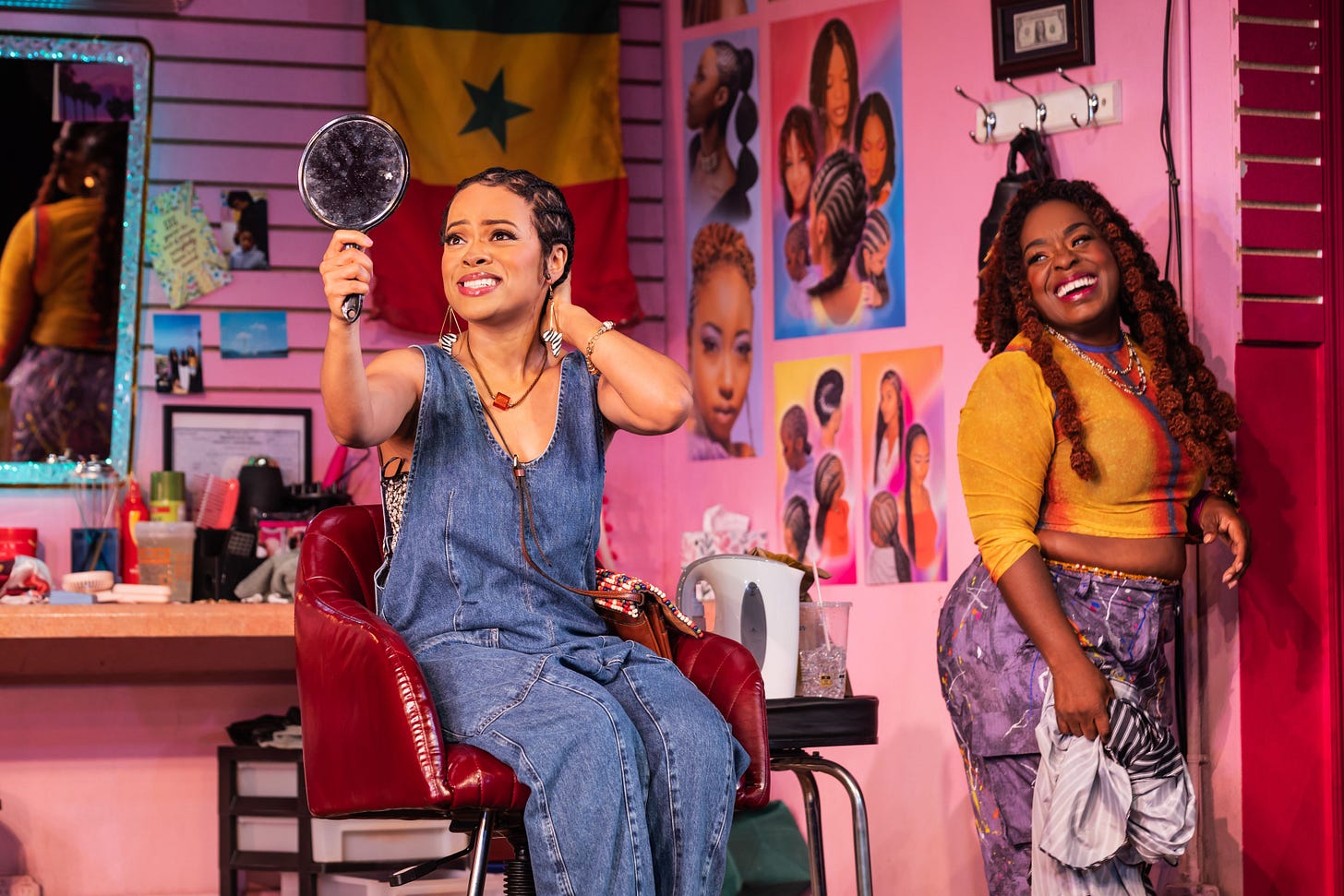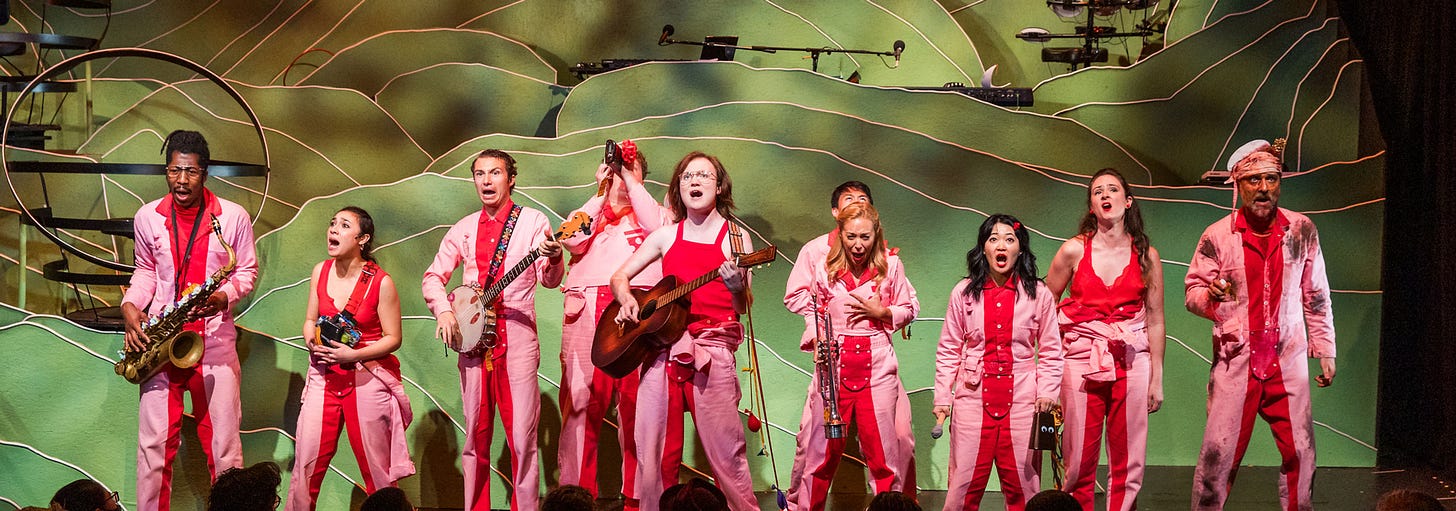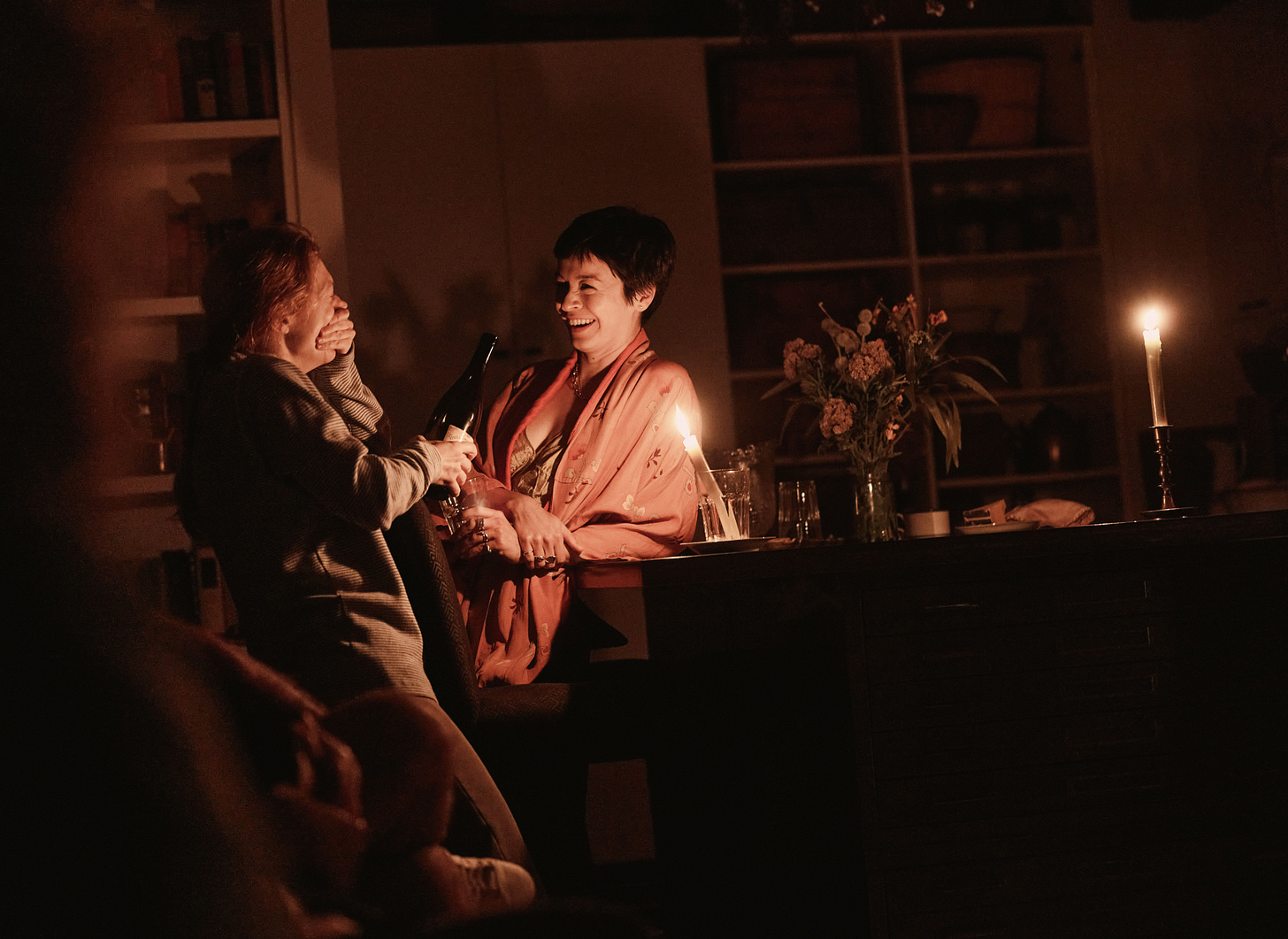10) Jaja’s African Hair Braiding (Manhattan Theatre Club)
Following 90 hilarious, intoxicating minutes spent with the community of Harlem salon Jaja’s African Hair Braiding, a world lovingly brought to life by playwright Jocelyn Bioh and director Whitney White (with a huge assist from David Zinn’s glorious set), this joyous play takes a sharp turn. News arrives that Jaja, the store’s owner, has been detained at her wedding by ICE.
It is a bitter finish to a happy evening. Yet by the time it arrives, we have fallen in love with Bioh’s bickering, intensely loyal ensemble. As they band together to help Jaja, we know those efforts may prove in vain. Still, they push on, fighting to hold together their small corner of the world.
9) In Corpo (The Assembly & Dutch Kills)
“I would prefer not to.” Borrowed from Melville, this refrain is handed down to a new Bartleby in undersung gem In Corpo, Ben Beckley and Nate Weida’s witty and unsettling new musical tracing an employee uprising at the last corporation on Earth.
After the denizens of Corpo finally unplug and break free, it is the fed-up technologist Bartleby (a terrific Austin O. Kelly) who reveals a stash of acoustic instruments. A guitar. A saxophone. Trumpet. Banjo. In the face of an oncoming flood, the former staff of Corpo sing and play together, even as they wonder: “Are we too late?”
8) Redwood (Ensemble Studio Theatre)
The brilliant Brittany K. Allen wrote and starred in EST’s shrewd new comedy Redwood, which followed an interracial couple thrown into turmoil after the discovery of a horrific connection in their respective family histories.
How else to confront the traumatic contradictions of America’s history than through comedy? Allen finds biting laughs as the couple, Meg and Drew, face down impossible questions and try to find a way forward.
In the play’s devastating finale, Meg senses the presence of a long-ago ancestor and understands—for a moment—that she carries a history Drew can never fully grasp, leaving us with the recognition that certain gulfs can never truly be bridged.
7) Let’s Call Her Patty (Lincoln Center Theater)
Disguised by Lincoln Center marketing as a lightweight comedy about a neurotic Upper West Side Jew, Let’s Call Her Patty was in truth a bitter critique of privileged, remote liberals struggling to confront any challenge that falls outside their carefully curated comfort zones.
Playwright Zarina Shea unsparingly depicts Patty’s self-centered response to her daughter Cecile’s drug addiction and mental collapse. Cecile is not let off the hook either; her abundant financial and educational privilege is made clear. But when Patty wonders to the audience, “What did I do wrong?” the chasm of understanding will be painfully familiar to anyone who has experienced an unexplainable despair.
6) Merrily We Roll Along (Hudson Theatre)
In a year packed with great Sondheim, this was the finest gem. Maria Friedman’s warm production solved the riddle of Merrily not with any grand device, but simply by hitting every beat flawlessly: gorgeous orchestrations, careful pacing and a perfectly balanced core trio.
This staging does clarify Frank as the emotional center of the story, providing space for astounding, career-defining work from Jonathan Groff. But as with any great theatrical interpretation, this shift does not place anything new upon the text—it simply draws out what had always been there.
5) Uncle Vanya (OHenry Productions)
Modestly and intimately staged in a Manhattan loft, Uncle Vanya was a marvel, impeccably acted by a tremendous ensemble. Jack Serio’s stripped-down staging drew out the depths of longing and despair in Chekhov’s text afresh, making the play feel almost brand new.
An especial highlight was Julia Chan’s Yelena, an elegant, almost otherworldly presence. She is mostly unreadable and yet shows, in her interactions with Marin Ireland’s tragic Sonia, what feels like a truthful and genuine kindness.
4) The Comeuppance (Signature Theatre)
Branden Jacobs-Jenkins’ haunting meditation on death, millennial despair and post-lockdown insanity. Despite an inadvisable runtime of 2:30 with no intermission, Jenkins’ ominous play was entirely engrossing, helped by Eric Ting’s perfectly calibrated production and an astonishing ensemble. The invaluable Bobby Moreno nearly walks away with the evening, delivering an anguished, near-psychotic howl of pain.
3) Salesman (Yangtze Repertory Theatre)
Two moments of pure theatrical magic made Salesman, Jeremy Tiang’s chronicle of Arthur Miller’s real-life 1983 trip to Beijing to direct a production of Death of a Salesman, a highlight of the year. The first comes when Miller plays a tape recording of the show’s original Broadway production for his Chinese cast. Listening closely to a language not their own, the cast nonetheless begins to find the play’s beats, helped along by actors they’ll never meet and a work they will never see.
The second comes in the play’s finale, when video of the real Chinese production is projected over director Michael Leibenluft’s artful recreations of the historic Beijing staging. Against all odds and despite a seemingly impassable cultural divide, you feel it: the play worked. Somehow, the pieces came together perfectly, and it worked.
2) School Pictures (Playwrights Horizons)
I was early on the School Pictures train, writing about its Wilma premiere last year, and Milo Cramer’s bittersweet journey through SHSAT tutoring in New York only deepened in its move to Playwrights Horizons. In particular, Cramer perfected their playful interplay with the audience, throwing us knowing smirks or rueful sighs as appropriate and, in one especially delightful image, aiming a paper airplane dead center into the audience.
A melancholy delight, the show is rich with empathy for both Cramer’s students and their parents. Cramer understands that the smallest kindnesses, like a parent remembering to buy and pack his daughter’s flashcards, can hit home the deepest.
1) Odyssey 1: Telemachus At Home
As larger theatrical institutions continue to struggle, particularly in financial terms, smaller-scale works in non-traditional spaces may point a way forward. The most searching, most involving and most immediate work I experienced all year was Odyssey 1: Telemachus At Home, the first chapter of Homer’s Odyssey performed by Joseph Medeiros entirely in Greek in his Queens apartment for an audience of three.
The work was not only an incredible theatrical feat, conjuring vast worlds with a few simple lights and pulleys, but also movingly reframed Telemachus’ story as a journey of queer discovery amidst a suffocatingly masculine and violent world.













